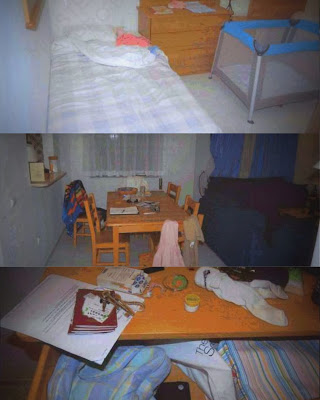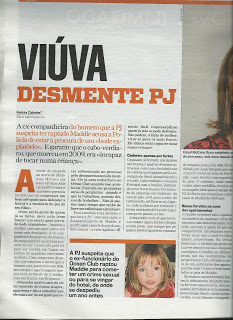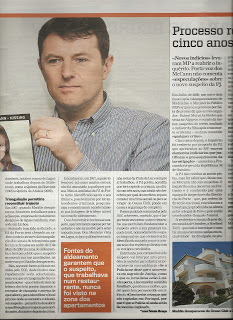Paper
edition
Widow
Contradicts PJ
The former partner
of the man
that the PJ suspects of having abducted
Maddie accuses the Police of searching
for a «scapegoat». And guarantees
that the Cape-Verdean, who died in 2009,
was «incapable of touching in a child».
by Felícia Cabrita/ with Sónia Graça
The widow of the suspect of Madeleine
McCann's death that lead the Judiciary
Police (PJ) to reopen the process has
guaranteed to SOL that she is
going to «hire a good lawyer to defend
the honour and memory of the father of
her son».
«They have spoken about so many people
already, it is disgusting that they are
now trying to set up a dead man as a
scapegoat», deplores the woman, who does
not wish for her name to be divulged.
The former partner of the suspect, in
his forties, was surprised last week
when she was notified to be heard by the
PJ, in Lagos, in the scope of the
inquest that has meanwhile been
reopened. A female officer told her that
they were investigating the man with
whom she had lived with until 2009, the
year in which the suspect died in a work
accident, with a tractor in Bragança
[North of Portugal].
«After four years have gone by since he
died in a tragic way, they appear and
they imply that he is being investigated
for being referenced in the process
relative to the girl's disappearance. He
didn't even work at the Ocean Club when
that happened. They asked me questions
upon questions: when did he work there,
when did he stopped working there... But
so much time has passed that I had to
make an effort to be precise.»
To the woman it is a mystery - six years
after Maddie's disappearance - the
reasons behind PJ sudden U-turn: «It is
very easy to responsibilize someone who
can no longer defend himself. They
can't, in the absence of something
better, blame the weakest links. He
would never harm a child.»
Criminal record only for thefts
The past of the man, who died when he
was forty years old, is similar to many
others, with the chaos that ensued in
the Portuguese former colonies after the
Carnation Revolution they left their
country. Cape-Verdean, he came to
Portugal with his family, he settled in
the North of the country. He moved from
job to job, from working in civil
construction to catering trade until he
took up residence in the Algarve, where
he would meet a young high school
student with whom he he went to live.
The dependency of drugs lead him to
commit some thefts and he was even
arrested, but always for petty crimes
linked to drug abuse. In 1996, he was
pardoned by the then president Jorge
Sampaio of a crime of theft committed in
the area of Portimão, that pardon
prevented him from being expelled from
the country. It was his criminal record,
where there is nothing about
paedophilia, that would make him the
ideal suspect for the PJ team from
Oporto who reanalysed the Madeleine
McCann process.
He was never seen in the area of the
apartments
His criminal record didn't help in terms
of jobs: he lived of odd jobs and didn't
do rebates. In 2006, the couple and
their son, a minor, survived with the
help of his partner's father, a small
local civil constructor. In the Summer
of that year, the tourism in Luz was
promising and he landed a job at the
“Millenium” restaurant, one of the
restaurants owned by the Ocean Club
group, located about one kilometre from
the apartments where Maddie's parents
would be lodged. However, according to
several sources from the tourist resort,
Monteiro was never seen in that area,
not while he worked there nor when, a
little while after, and still in peak
season, they invited him to leave. «He
was caught taking five euros from the
till and we invited him to leave. We
were surprised because he was always a
proper man, of good appearance who spoke
very well. And since it was such a small
amount we never made a complaint», told
a source from the tourist resort to SOL.
A female colleague that worked with
him at the “Millenium” stated: «One
thing is to steal five euros, another is
to murder a child. Specially when he
spent all the time speaking about his
son, whom he loved. And I very much
doubt that he has ever gone to the
apartment areas. Firstly, he worked in
here for a very short period of time,
then he started working at four in the
afternoon and left at midnight» And she
recalls: «It's farcical that the PJ now
say that he could have have abducted the
girl in revenge for being fired, when he
accepted that fact with humbleness.»
In his life path, Monteiro never knew
another luck. In the Algarve, for those
who work in the catering business,
employment is seasonal and the man never
had a stable job. Nevertheless, no
outburst of rancour is known that could
have lead him to retaliate - namely, in
the other tourist resorts where he
worked after leaving the “Millenium”,
such as Quinta da Boavista in 2008 and
Quinta da Atalaia in 2009.
Trilateration would allow to
reconstitute the route
In 2007, when Maddie disappeared,
Monteiro worked for Sisaqua, a water and
waste water treatment plant,
headquartered in Lisbon. According to
the news, the Oporto PJ would have
arrived to the former employee through
the triangulation of cell phone signals
which were activated in the night of May
3, 2007 in the area of the tourist
resort, and they would have understood
that the suspect was in the vicinity in
the night when Maddie disappeared.
However, according to police sources
heard by SOL, in this manner the case
would have been easily solved, since the
trilateration of communications - that
is done through the reading of three
points (the transmitter, the receiver of
the signal and the cell phone operator
mast) in order to identify the precise
location of the suspect's cell phone -
would allow to discover its direction
and the route taken before, during and
after the crime.
Initially, in 2007 that cell phone, like
many others, wasn't associated to any
person. However, analysts from the PJ in
Oporto would have now identified its
owner and, possibly due to his criminal
records, they have researched and found
that number in the mobile traffic
listings from the tourist resort area.
The former employee became a suspect,
apparently only because he had a
criminal record and not because he was
in that area. On the other hand,
Monteiro, lived in Lagos, just five
kilometres (in a straight line) to Praia
da Luz and has always worked in that
area. The PJ, nevertheless, believe that
he would have abducted the child, who
was at the time three years old, but
they have not yet determined for which
motive: if for committing a sex crime or
to take revenge on the Ocean Club, to
place in question the security of the
tourist resort.
Police sources contacted by SOL warn,
nonetheless, that it is important to
find other elements to enable the
substantiation of his presence in that
area, namely, the period of time in
which the cell phone was identified in
that area and the comparison of the
police records with vestiges that were
gathered.
Meanwhile, the former partner of the
suspect is going to take legal action,
an injunction, to keep journalists away
from her house. «If the police told me
that the case is in secrecy of Justice,
how come journalists are at my door,
bothering my family?» questions the
woman, who until now has remained
silent. «When so many children are
abducted in Portugal, how come the
police is only after the English child?»
Sol, November 1, 2013 | Paper edition,
pages 18 and 19
|




